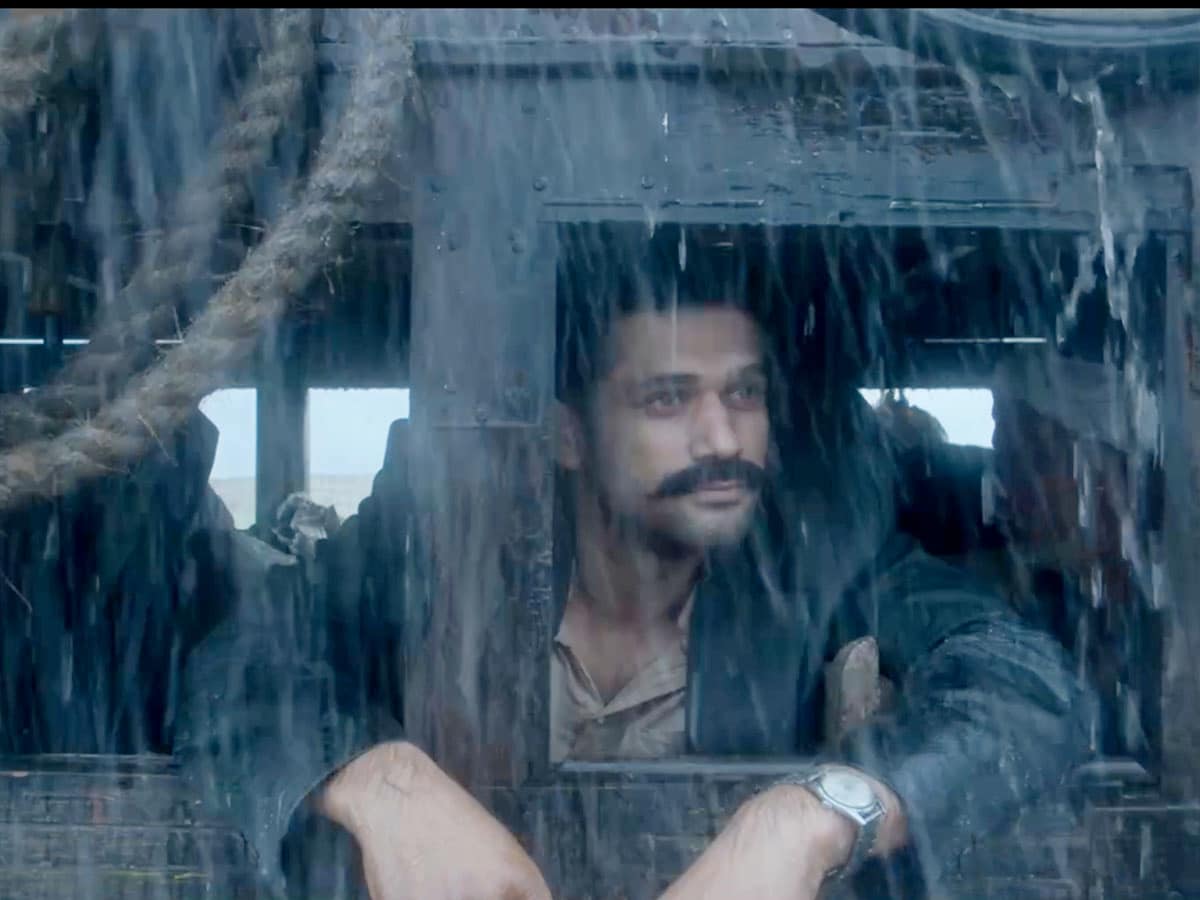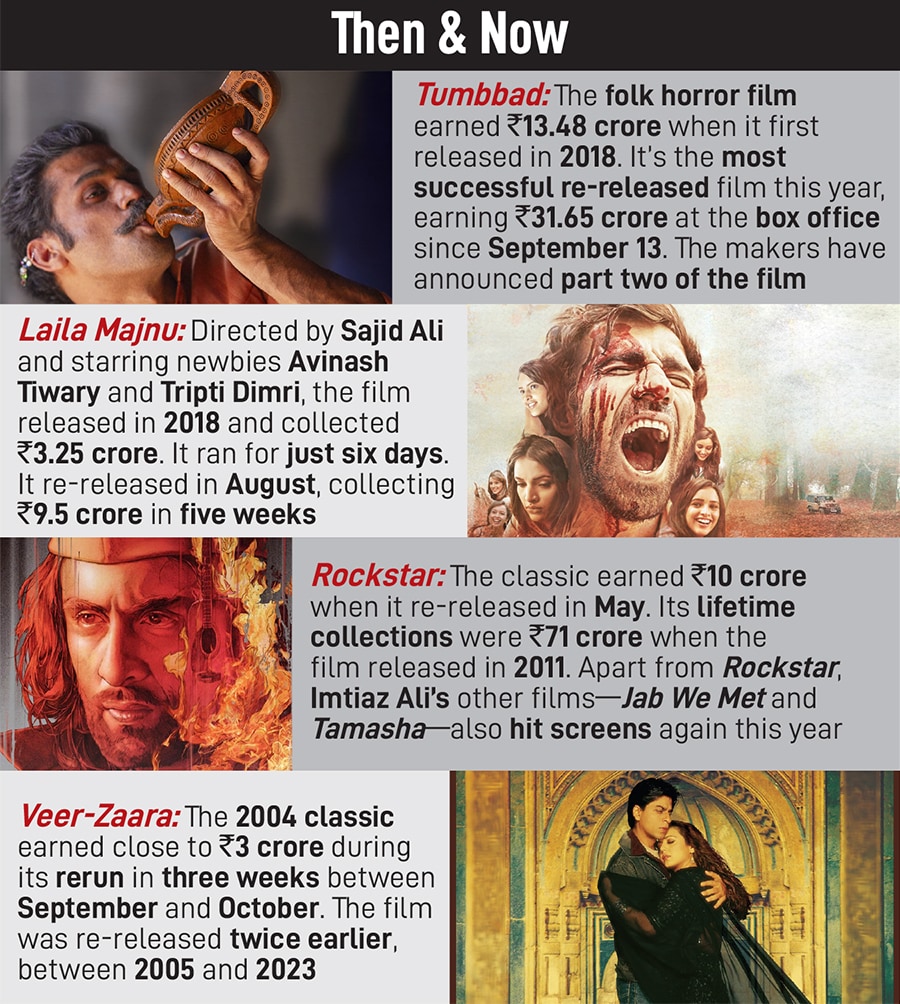Re-released films, on the other hand, are enjoying a new lease of life, thanks to the nostalgia associated with them and the quality of content. Apart from Rockstar that eventually collected Rs 10 crore and Tumbbad, some of the older films that have performed well in their second innings are Laila Majnu, Rehnaa Hai Terre Dil Mein and Veer-Zaara. This trend may continue, according to filmmakers and industry experts.
Sajid Ali, director of Laila Majnu, says the overwhelming reception to his film this time was something he didn’t see coming. Three to four months before the 2018 film hit screens the second time, Ali had noticed some activity related to it on social media, but dismissed it as “just a phase". He realised the gravity of it when he was in Kashmir—where the film is set—with lead actor Avinash Tiwary a week before the re-release. There was a meet-and-greet session there and the filmmaker thought no one would turn up. “But there was a near stampede," he says, adding that he told the assembled crowd that since there was a theatre in the Valley, they should ask the owners to screen the film if they wished to see it. Within a week, Ali’s brother and the film’s screenplay writer, Imtiaz Ali, spoke with PVR Inox’s managing director Ajay Bijli to check if it was indeed a good idea to re-release the film. The results speak for themselves.
Laila Majnu, which had earned Rs 3.25 crore when it first released, collected around Rs 9.5 crore this time in five weeks. “It’s taken me a while to wrap my head around what has happened," says Ali. “The one thing that I have understood is that people wanted to watch the film in theatres. Most people who came had already watched Laila Majnu, and many of them, if not most of them, multiple times. And yet they wanted to spend their money, and more important, their time. And they made the effort to watch the movie in theatres, when they could have watched it for free or for minimal money [on OTT]."
![]() Niharika Bijli, lead-strategist, PVR Inox
Niharika Bijli, lead-strategist, PVR Inox
Imtiaz tells Forbes India that many things have been strange and unusual about Rockstar’s re-release. The excitement 13 years later was one of them. “People flocked to the theatres and the trade started taking notice when the amount it collected became substantial. It was a pleasant surprise that reinstated the fact that we work with—that the film is permanent," he says. “It was a matter of great happiness for everyone involved but also for people who make and watch cinema. The possibility of a film coming back into the theatres to be enjoyed in full measure on the big screen has become a reality and that’s good news for Indian cinema."
Niharika Bijli, lead-strategist, PVR Inox, emphasises that the success of the re-released films is not necessarily a reflection on the climate of the new movies. “Re-released films are a different category and have a separate audience," she says. “We are giving the audience more options during leaner periods… if there’s a gap between two films, for instance. And it’s heartening and encouraging to see that the audiences are accepting and seeking out this option. It’s a testament to two things: The timeless nature of these films and the big-screen experience. People want to experience or re-experience them in cinemas although they are available on other platforms. The appetite of the Indian audience who consumes films is unmatched."
![]()
PVR-Inox is known to showcase older films closer to occasions like film anniversaries or birthdays. For instance, recently, it announced a Kareena Kapoor Khan festival to celebrate the actor’s 25th year in the industry and re-released films such as Omkara, Jab We Met and Chameli. And in October 2022, it hosted Bachchan: Back to The Beginning to coincide with mega star Amitabh Bachchan’s 80th birthday.
The audiences come in droves for such re-released films and retrospectives, says Bijli. “There are three types who watch these: The nostalgia public, the Gen-Z or Gen Alpha—those who were too young to understand when the film initially released—who are extremely curious, and the cinephiles or film appreciators," she adds.
![]() Actor Sohum Shah in Tumbbad
Actor Sohum Shah in Tumbbad
Shah points out that the booming business of re-released films is a case study for the industry. “This is a new revenue model for filmmakers. Cinema chains will also benefit, especially now, when films are released to empty seats," he says. Ali feels there have been learnings in hindsight, but the attention is more enjoyable now. “It’s a bonanza monetarily, but this is bigger than money… it’s in terms of value. Money can’t buy those things." Imtiaz, too, looks at the positives and the ensuing lessons. “One should make films with complete involvement, and not with the narrow-minded methodical approach of just the initial box office performance. There’s a difference between the film business and the stock market business. And we should understand that. We should work on the quality of films rather than just the speculation of the market," he explains.
Filmmakers feel the industry needs to introspect on a lot of things and this acceptance to re-released films compared to the new ones is a telling comment on what’s wrong at many levels. “We are not investing in writing the way we should. We are not nurturing writers. Writers are the spine of the industry… they are bigger than the directors," says Shah, who has acted in films like Simran, Maharani and Dahaad, and whose next as actor-producer is Crazy. He feels Tumbbad was ahead of its time and that the audience was not ready for such content and international-level VFX earlier. “The lens has changed. The audience is now educated, advanced, learned and matured… they have watched international cinema, and won’t settle for anything mediocre."
![]()
The fact that the movie has built a good fan base in the last six years has also proved to be beneficial. When the film first released in 2018, says Shah, the release date also had an impact—Tumbbad had to deal with Andhadhun that came a week prior and Badhaai Ho that hit screens the following week. He, however, clarifies that the film had recovered its money with box office performance and satellite rights, and that whatever it is earning now is profit.
Imtiaz also feels there was a certain community of Laila Majnu that had been built over the years. “This time, it was almost like going on a date with a known lover knowing what to expect, and sometimes, enjoyed multiple times. It was the same with Rockstar… people who were not in the right age group 13 years ago came back to the theatres. Both the films got a fresh audience which is like fresh blood coming into Indian cinema. I am happy that all the love with which we make films is reaching to the audience," says Imtiaz, whose Jab We Met and Tamasha also hit screens again this year.
![]()
Ali believes the fact that the lead cast [Tiwary and Tripti Dimri] and he were new in 2018 had a bearing on the audience not showing enough faith in Laila Majnu then. They were waiting for word-of-mouth, but, unfortunately, the film was out of screens in six days. The story, he believes, would have been different had it stayed in theatres for a week more. But its success six years later has shown that films are for a lifetime. “Financers, studios and producers would probably want to invest a little more in quality. Because now there is a market in everyone’s mind… that if you make a good film, maybe not the first time, but there could be another time when we can explore it. Films last longer than box office. I hope people will not be so quick to judge them," says Ali, who has directed Woh Bhi Din The and co-directed Dr Arora previously, and is now working on a couple of projects, one of which is a love story.
PVR Inox’s Niharika Bijli says that though they had been doing re-releases in metros like Mumbai and Delhi for a long time, they had been few and sporadic. “This year has opened our eyes and the audiences have come back strongly," she adds. “It’s no longer a one-off piece or a filler. It’s become a strategy. We are looking for strategic programming for re-releases now. It’s not just a show, but a film coming out, with a decent amount of marketing, plenty of buzz and the right kind of programme."
![]()
It"s a collaborative effort from the theatre owners and the film fraternity. The re-release timing and strategy are decided accordingly. The Tumbbad team, explains Bijli, went all out. “They cut new promos and marketing material. Their excitement and contribution helped a great deal in pulling in the audience."
People were enjoying the film and there was a standing ovation at the end, claims Shah, who went to a few theatres to gauge the audience reaction to Tumbbad’s re-release. At the end of the film, the makers had a teaser about part two. “That resulted in plenty of hooting… it adds to the curiosity," says Shah, who will act in the sequel that is currently in the pre-production stage and will go on floors next year.
The healthy performance of the re-released films augurs well for the industry that has seen some of its lowest numbers in the recent past. The fraternity will hope that highly anticipated films such as Bhool Bhulaiyaa 3 and Singham Again will turn the tide in its favour. If not, there’ll always be some old classic that will win over the audiences again.







